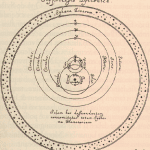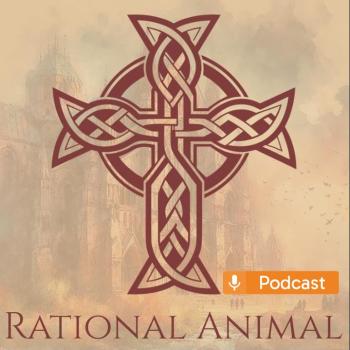***
***
This topic came up as I defended a humorous meme about Calvinism. Dr. Glenn Peoples [words in blue below], a Protestant, brought up the topic on his Facebook page, claiming (based entirely on the meme) that I didn’t “understand the view being critiqued” and “Know your theology or look silly when joking about it.” The entire unfortunate exchange with him and a Reformed Baptist named William Tanksley, Jr. [words in green] was recorded in a lengthy blog piece (unedited, as Glenn’s page was: deleting several remarks of mine).
The upshot of virtually all of the criticisms aimed at yours truly during that exchange was that I had no idea what I was talking about: particularly, that I didn’t understand that St. Augustine’s view was not contrary to the Calvinist doctrine of total depravity at all. Here are the remarks along those lines:
. . . he should at least understand what he’s talking about, and in the second place he’s making fun of Augustine!
Fantastic quotemine of Augustine, based on a pathetic parody of Calvinism, as though “total depravity” meant “maximum evil”. As Augustine and Calvin agreed, evil has no maximum — it is a privation, not a positive. . . . Calvinism doesn’t teach that man has an utterly evil nature in the sense that Augustine is teaching against. The Eastern Orthodox attack Augustine with exactly the same misunderstanding that you attempt to play against Calvin.
Now you’re pressing me to tell you everyone who’s corrected you … Well, everyone who’s taught Calvinism that I’ve ever read. Everyone you’ve debated with against whom you chose to open, as you did here, by claiming that Augustine was contradicting Calvin on the concept of Total Depravity by saying that there’s no such thing as utter evil.
. . . you teach people about Calvinism using absurdities that only someone completely uneducated in Calvinism could believe. You wouldn’t last one minute in a debate if you’d brought those out; therefore you know enough not to do that.
. . . now that you have brought up total depravity, all of those quotes are entirely compatible with it.
I produced several Augustine quotes which I claim to be related to this topic, from my own book, The Quotable Augustine:
. . . let them cease to say and to teach that there are two kinds of souls, one of which has nothing of evil, the other nothing of good . . . (Soul.c.M, 14)
. . . every nature, as far as it is nature, is good; since in one and the same thing in which I found something to praise, and he found something to blame, if the good things are taken away, no nature will remain; but if the disagreeable things are taken away, the nature will remain unimpaired. (C.Fund.M, 33, 36)
. . . enough has been said to show that corruption does harm only as displacing the natural condition; and so, that corruption is not nature, but against nature. And if corruption is the only evil to be found anywhere, and if corruption is not nature, no nature is evil. (C.Fund.M, 35, 39)
. . . God’s image has not been so completely erased in the soul of man by the stain of earthly affections, as to have left remaining there not even the merest lineaments of it . . . what was impressed on their hearts when they were created in the image of God has not been wholly blotted out . . . this writing in the heart is effected by renovation, although it had not been completely blotted out by the old nature. . . . the law of God, which had not been wholly blotted out there by unrighteousness . . . (Sp.L, 48)
. . . no one is evil by nature, but whoever is evil is evil by vice . . . (City xiv, 6)
. . . evil cannot exist without good, because the natures in which evil exists, in so far as they are natures, are good. (City xiv, 11)
. . . there is, owing to the defects that have entered our nature, not to the constitution of our nature, a certain necessary tendency to sin . . . (Nat., 79 [LXVI] )
And in the same way, just as an evil tree cannot bring forth good fruit, so an evil will cannot produce good works. But from the nature of man, which is good, may spring either a good or an evil will. And certainly there was at first no source from which an evil will could spring, except the nature of angel or of man, which was good. (Ench., 15)
Sources:
392 / 393 Soul.c.M Of Two Souls, Against the Manichees (De duabus animabus contra Manichaeos) [tr. Albert H. Newman; NPNF 1-4]
397 C.Fund.M Against the Fundamental Epistle of Manichaeus (Contra epistulam quam vocant fundamenti) [tr. Richard Stothert; NPNF 1-4]
412 Sp.L On the Spirit and the Letter (De spiritu et littera) [tr. Peter Holmes and Robert E. Wallis, rev. Benjamin B. Warfield; NPNF 1-5]
414 / 415 Nat. On Nature and Grace (De natura et gratia) [tr. Peter Holmes and Robert E. Wallis, rev. Benjamin B. Warfield; NPNF 1-5]
413-427 City City of God (De civitate Dei) [tr. Marcus Dods; NPNF 1-2]
421-422 Ench. Enchiridion: Handbook on Faith, Hope, and Love (Enchiridion ad Laurentium) [tr. J. F. Shaw; NPNF 1-3]
Now, the key in the quotations above is the notion of “an evil soul,” or as Augustine puts it in the first selection, there are not “two kinds of souls, one of which has nothing of evil, the other nothing of good.” He says, “every nature . . . is good”; and: “no nature is evil”; and: “no one is evil by nature”; and: “the nature of man, which is good.”
These notions I take to be contrary to Calvinist total depravity. Are they? My friends above say no. Well, we shall see, by consulting Calvin and Calvinists. My claim is not that Calvinists claim that unregenerate, fallen man can do no outwardly good acts whatsoever. They deny that, and it is the caricature of total depravity, made by those who don’t study it, and what Calvinists themselves teach about it.
What Calvinism does teach is precisely what Augustine denied above: that there is such a thing as an entirely “evil nature”. Calvinists sort of play this both ways. They readily agree that the unsaved man can do good things. Hence, John Piper, prominent reformed Baptist pastor and author, stated in 1998:
Of course totally depraved men can be very religious and very philanthropic. They can pray and give alms and fast, as Jesus said (Matthew 6:1-18).
The Calvinist retorts to unfortunate, inadequately informed critiques: “see! We say that fallen man can do good stuff. He’s not absolutely evil, as you guys falsely claim that we teach!” But Piper on the other hand, also says this:
In his total rebellion everything man does is sin.
In Romans 14:23 Paul says, “Whatever is not from faith is sin.” Therefore, if all men are in total rebellion, everything they do is the product of rebellion and cannot be an honor to God, but only part of their sinful rebellion. If a king teaches his subjects how to fight well and then those subjects rebel against their king and use the very skill he taught them to resist him, then even those skills become evil. Thus man does many things which he can only do because he is created in the image of God and which in the service of God could be praised. But in the service of man’s self-justifying rebellion, these very things are sinful.
Got that? This is the doctrine, originally taught by both Luther and Calvin, that even when fallen, unregenerate, unjustified man does things that “could be praised” if a Christian had done them, nevertheless they remain evil in essence. Everything such a man does is of this nature. Outwardly it appears good, but in reality and in God’s eyes, it’s really evil and wicked. Piper clarifies this understanding:
. . . we will have to say that it is good that most unbelievers do not kill and that some unbelievers perform acts of benevolence. What we mean when we call such actions good is that they more or less conform to the external pattern of life that God has commanded in Scripture. However, such outward conformity to the revealed will of God is not righteousness in relation to God. . . . Therefore even these “good” acts are part of our rebellion and are not “good” in the sense that really counts in the end — in relation to God.
Calvinism thus requires a sort of Orwellian “doublethink”: things can be good and bad at the same time, and outwardly good but inwardly or at bottom, or essentially evil. Piper thus summarizes: “total depravity means that our rebellion against God is total, everything we do in this rebellion is sin, . . .”.
St. Augustine contradicts this, because he denies that man is evil by nature, and can do no good whatsoever (in essence) in fallen state (“what was impressed on their hearts when they were created in the image of God has not been wholly blotted out”). Some good remains, whereas Calvin and Calvinism expressly deny this. It’s the difference between original sin and the fall in Arminian / Catholic vs. Calvinist thinking.
Did Calvin himself teach this evil human nature / total depravity? Was human nature for him, deprived of all good whatsoever, and evil in essence, or does it remain good to some extent, as in Augustine? It is the former:
Original sin, then, may be defined a hereditary corruption and depravity of our nature, extending to all the parts of the soul, which first makes us obnoxious to the wrath of God, and then produces in us works which in Scripture are termed works of the flesh. . . . their whole nature is, as it were, a seed-bed of sin, and therefore cannot but be odious and abominable to God. . . . For our nature is not only utterly devoid of goodness, but so prolific in all kinds of evil, that it can never be idle.
(Institutes of the Christian Religion, Book II, ch. 1, 8)
. . . such is the depravity of his nature, that he cannot move and act except in the direction of evil. If this is true, the thing not obscurely expressed is, that he is under a necessity of sinning.
(Institutes of the Christian Religion, Book II, ch. 3, 5)
Thomas Gregory, in “The Presbyterian Doctrine of Total Depravity,” posted at R. C. Sproul’s website, states about the latter passage that it is “the most loathsome element in our understanding of total depravity ” and continues:
The simple truth of this “grand point of distinction” is that our whole nature, in part and functions, is set in its own way, and as such loves to sin against God, and therefore must sin against God.
Calvinist confessions agree. The Belgic Confession (article XIV) states that man “willfully subjected himself to sin” and thereby “separated himself from God” and “corrupted his whole nature.” The Westminster Confession (Ch. VI, sec. 6 [6.036]) describes fallen man as “utterly indisposed, disabled, and made opposite to all good, and wholly inclined to all evil.” The Second Helvetic Confession (chap. VIII [5.037]), claimed that man is “immersed in perverse desires and adverse to all good.”
No one need take my word alone, that St. Augustine’s view of original sin and the fall and his view of the notions involved in “total depravity” were different from Calvin’s. In his article, “The Doctrines of Grace in Calvin and Augustine” (Evangelical Quarterly, Vol. 52, 1980, pp. 84-96) Larry D. Sharp makes it clear that he himself prefers Calvin’s view. He states that it is different from Augustine’s, and goes further than that of the great Church father:
Outside the Bible Augustine was Calvin’s greatest source. The Institutes and Calvin’s other major writings are virtually flooded with quotations of the widely respected church father. Calvin even claimed to be merely restating Augustine on some points, and some Reformed interpreters of Augustine have practically made him out to be an early Calvinist.
The affinities between the two men are not merely legendary. Both argued vigorously that salvation is totally a gift of God’s grace. Both tried to be faithful Paulinists. Nevertheless, these similarities have led to many unwarranted assumptions concerning the so-called “Augustine- Calvinistic tradition.” My thesis is that Calvin goes considerably beyond Augustine in some crucial areas and that these differences are not now generally recognized. . . .
To the extent that Augustine makes original sin to be a privation of the good or an absence of the qualities of original righteousness, we may say that there is still here a trace of his earlier Neoplatonism.
The effect of Adam’s sin is that man is now in a condition of sickness and weakness or a privation of health and strength. If it were possible for a person to be self-sufficient for fulfilling the law and for perfecting righteousness, then that person would be saved apart from instruction and faith in the death and resurrection of Christ. But, due to original sin, men are left darkened and weakened and in need of light and healing. Adam’s sin then is a “wound,” a “hurt,” an “injury” which must be healed.! And so salvation is God’s healing by grace the “sickness” of sin; he takes the element of health remaining and making it better and he takes what is weak and makes it stronger.
Calvin followed Augustine in affirming the heart of the doctrine of original sin: that Adam’s death in sin meant the death in sin of us all and that this state is passed down to all persons, even newborn infants. But for Calvin the essence of this sin is not mere self-love as in Augustine, but pride and rebellion and outright disobedience. Original sin is not merely a privation or an emptiness of original righteousness, but rather a blatant perversity which is always actively producing the works of the flesh. The effect of Adam’s sin is not only a wound and a sickness, as in Augustine, but is a total depravity and corruption. To describe sin as a lack of health and light and righteousness is to Calvin not to have “expressed effectively enough its power and energy.” The result of Adam’s sin is more properly called the ruin of man than the illness of man. . . .
It is clearly a mistake to try to read Calvin’s doctrine of total depravity into Augustine as some have done. Calvin was not influenced, as Augustine was, by traces of Greek philosophy, and thus he better captured the biblical teaching on the utter ruin of man after the Fall and of the exceeding sinfulness of sin. Augustine’s doctrine of original sin, while acceptable as far as it goes, is faulted for the very reason that it does not go far enough. By removing any semblance of real righteousness from the nature of man, Calvin did go far enough and his doctrine of original sin is, in my judgement, to be preferred.
It’s all summed up in the title of N. Vorster’s paper: “Calvin’s Modification of Augustine’s Doctrine of Original Sin”. He writes:
Calvin’s emphasis on original sin as a corruption of the mind and the will is not in the same intellectual tradition as the Augustinian one (Pitkin, 1999:360). Augustine understands sin as concupiscence. The fallen will lacks the power to achieve the good that the intellect knows. Calvin, however, intensifies the problem of sin by stating that the mind itself no longer knows the good to be done. This dissimilar understanding of sin is largely due to a different understanding of the essence of human nature. . . .
. . . in contrast to Augustine [who] locates the effects of sin in man’s loss of control of his physical desires, Calvin locates the crippling effects of the corruption of the image in the soul. According to Calvin the taint of sin resides in the flesh and the spirit. The flesh – which must not be equated with the human body – designates in Calvin’s thought the whole human being in the condition of sinfulness.
In The Catholic Encyclopedia (1907): “Teaching of St. Augustine of Hippo,” the author (citing Protestant scholar Cunningham) observes the differences between Calvin’s and Augustine’s conceptions of original sin:
W. Cunningham (Saint Austin, p. 82 sqq.) has very frankly called attention to the complete doctrinal opposition on fundamental points which exists between the Doctor of Hippo and the French Reformers. In the first place, as regards the state of human nature, which is, according to Calvin, totally depraved, for Catholics it is very difficult to grasp the Protestant conception of original sin which, for Calvin and Luther, is not, as for us, the moral degradation and the stain imprinted on the soul of every son of Adam by the fault of the father which is imputable to each member of the family. It is not the deprivation of grace and of all other super-natural gifts; it is not even concupiscence, understood in the ordinary sense of the word, as the struggle of base and selfish instincts against the virtuous tendencies of the soul; it is a profound and complete subversion of human nature’ it is the physical alteration of the very substance of our soul. Our faculties, understanding, and will, if not entirely destroyed, are at least mutilated, powerless, and chained to evil.
For the Reformers, original sin is not a sin, it is the sin, and the permanent sin, living in us and causing a continual stream of new sins to spring from our nature, which is radically corrupt and evil. For, as our being is evil, every act of ours is equally evil. Thus, the Protestant theologians do not ordinarily speak of the sins of mankind, but only of the sin, which makes us what we are and defiles everything. Hence arose the paradox of Luther: that even in an act of perfect charity a man sins mortally, because he acts with a vitiated nature. Hence that other paradox: that this sin can never be effaced, but remains entire, even after justification, although it will not be any longer imputed; to efface it, it would be necessary to modify physically this human being which is sin. Calvin, without going so far as Luther, has nevertheless insisted on this total corruption. . . . “Now,” says Cunningham, “this doctrine, whatever there may be to be said for it, is not the doctrine of Saint Austin. He held that sin is the defect of a good nature which retains elements of goodness, even in its most diseased and corrupted state, and he gives no countenance, whatever to this modern opinion of total depravity.”
Lastly, in Augustine Through the Ages: An Encyclopedia (general editor Allan D. Fitzgerald, Grand Rapids, Michigan: William B. Eerdmans Pub. Co., 1999), the single best one-volume source on St. Augustine, the article on Calvin backs up my position. The author of the article is David J. Marshall:
There is, however, one teaching of Augustine that is fundamentally philosophical, and concerning which Calvin has grave hesitations, apparently on the grounds that it is philosophical. It is the teaching that evil is not a reality, but only a privation of good (conf. 7.12), a teaching that Augustine defends repeatedly, especially after his second conversion (cf. civ. Dei, passim) . . . The fact that Calvin made such sparing use of Augustine’s voluminous anti-Manichean literature is presumably to be traced to Calvin’s hesitations concerning the grand principle that dominated it: malum est privatio boni [“evil is the privation of good”].
In De natura boni, one of the rare works of Augustine to which Calvin does not make a single reference, Augustine spells out his argument against the Manichaeans, which is simplicity itself: God is good, and as nothing exists except God and the things that God has made, everything is good. What may properly be called evil is found, not in the physical world, but in the hearts of human beings, and it consists of the fact that their heart is not always there.
The mildness with which Calvin rejects the teaching suggests that he did not think it worthy of serious refutation: “I shall not assert with Augustine that in sin, or evil, there is nothing positive, though I cheerfully embrace the position as having truly been held by him. . . .” (De aeterna Dei praedestinatione, 1552, CR 8:353). Plato did not hold creatio ex nihilo, but viewed matter as uncreated and essentially foreign to the divine. In this context, therefore, Calvin’s position is closer to Plato’s than to Augustine’s.
(p. 119; section: “Where Augustine Goes Beyond Calvin”)
Marshall’s analysis contradicts the assertions of William Tanksley, Jr. above: “As Augustine and Calvin agreed, evil has no maximum — it is a privation, not a positive.” Calvin states: “I shall not assert with Augustine that in sin, or evil, there is nothing positive.” I guess Marshall, too, would “teach people about Calvinism using absurdities that only someone completely uneducated in Calvinism could believe” and “wouldn’t last one minute in a debate”. I’m proud to be in William’s doghouse with the Augustine scholar.
*****


















